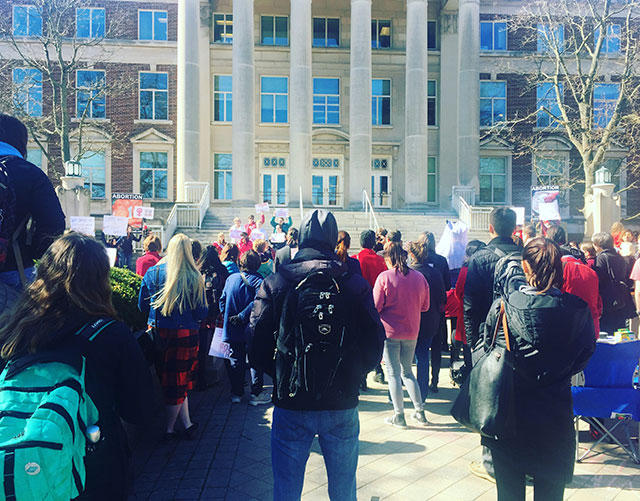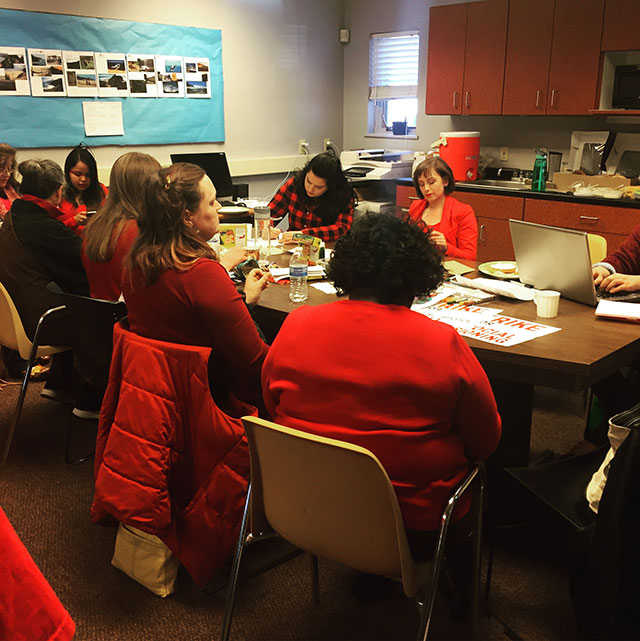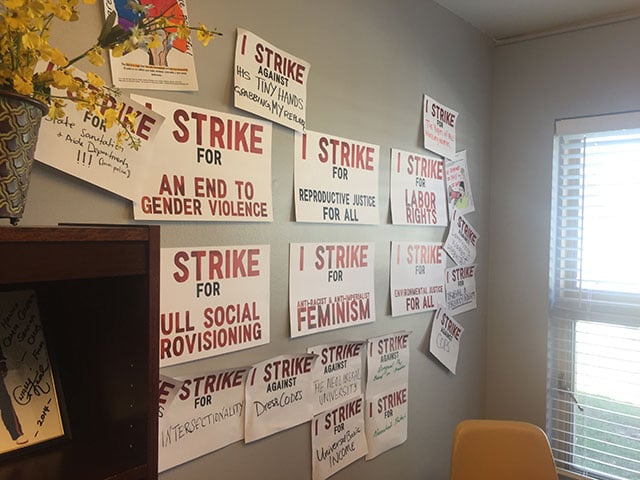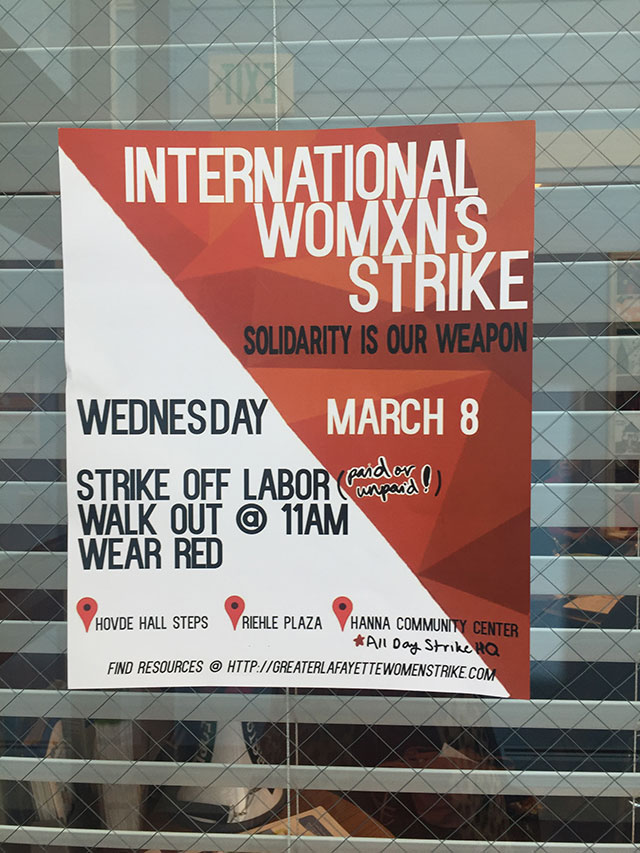
Did you know that Truthout is a nonprofit and independently funded by readers like you? If you value what we do, please support our work with a donation.
Since election night 2016, the streets of the US have rung with resistance. People all over the country have woken up with the conviction that they must do something to fight inequality in all its forms. But many are wondering what it is they can do. In this ongoing “Interviews for Resistance” series, experienced organizers, troublemakers and thinkers share their insights on what works, what doesn’t, what has changed and what is still the same. Today’s interview is the twentieth in the series. Click here for the most recent interview before this one.
I spent March 8, International Women’s Day and the day of the Women’s Strike, in Lafayette, Indiana, the heart of Mike Pence country. Feminist organizing in a state until recently governed by a far-right opponent of abortion and gay rights presents special challenges, and I spoke with two of the organizers of the Women’s Strike about the work that they did to create the conditions for a Women’s Strike and the work they’ll be doing in its wake to strengthen their organizations. I first spoke with Megha Anwer, a member of the faculty at Purdue’s Honors College, at the walkout on Purdue University’s campus.
Sarah Jaffe: You are one of the organizers of the walkout here.
Megha Anwer: Yes, I am one of the members of the planning committee, and the planning committee is constituted by a whole diverse group of women. We have been very concerted in highlighting the work and the labor and the organization of women of color, of trans women. It is a pretty incredible planning committee. It is hard for us to have done this in a small town like this and on a conservative campus, which is primarily an engineering campus. But we are happy with what we had today.
We are here in Indiana in Mike Pence country — I guess it is not Mike Pence country anymore because he is in DC now.
That is right. Mike Pence’s country is spreading.
Tell us about doing feminist organizing in Pence country.
It has been hard, but I think more and more women are aware of the fact that their rights can very easily be pulled from under their feet. Even here, this is contested territory. It is hard to win women over and convince them why their absolute right over their bodies is imperative. It is a struggle that is ongoing. I think what is happening is, these are things that women of color and trans women have known all along, but finally, in a certain sense, white liberal feminists are waking up to truth at their own doorsteps….
Talk about the importance of a strike, in particular.
“Strike” has become such a tainted word. It is because the people in power are so invested in making us afraid of our own weapons of emancipation, which is why “strike” is a filthy word. We have been taught that the only way in which we have meaning is if we are compulsively laboring for the very people who oppress us…. What we are trying to do is recover the word and emancipate our language and stop it from being the unspoken word so that we can liberate our souls.
 The walkout on Purdue University campus. (Photo: Sarah Jaffe)
The walkout on Purdue University campus. (Photo: Sarah Jaffe)
How was the response on campus from students and faculty while you were organizing?
It is hard. You keep organizing and then you find that there are still so many people who know nothing about what is going on…. We have been taught to be ignorant of our rights, but also of the people who are taking away our rights from us. It has been hard, but we have received so much support. I know that a lot of women who wanted to strike, for example, but are vulnerable in their jobs came out and there were other women stepping in for them and substituting [for] them while they wanted to be here. There are other women who have not been able to come out at all, not been able to walk out, but they are all wearing red. I think we are striking both inside and outside of offices.
You mentioned there is a space downtown that is strike headquarters.
There is a space downtown which is a walkout venue, but there is a spot in the town, Hanna Community Center, which is our headquarters. That is a space that has been open from 9:00 am to 6:00 pm today. All the planning committee members are there and we have had people from the community, union members come out there. We have bagels. We have coloring sheets. We have got this artwork going where we are creating one artefact for all the women in our lives and weaving threads and ribbons together. We just have a space where we can experience what community building can feel like.
To all the politicians who say that this is all just paid protestors and coastal liberals, what would you say?
There are separate things that I would say to the politicians who think I have been paid to do this. This is one of the many things that I am not being paid to do, but this is one of the few things, one of the few forms of unpaid labor that I am willing to do and put my body on the line for and demand, like I said, what is our right.
To those who say that strike is only the luxury of the privileged, that is bullshit. Strike is the most basic form of resistance for the most vulnerable women. It is precisely the most vulnerable women that have come out and demanded their rights over the history of modernity, really. People should stop shaming women who strike. The other thing is, of course, it doesn’t matter whether you are liberated or not, whether you are privileged or not. What matters to us is how you are using your privilege. If you have been privileged and you are coming out to stand in solidarity with the most vulnerable women, then you are using your privilege right.
***
 Hanna Community Center women’s strike HQ. (Photo: Sarah Jaffe)
Hanna Community Center women’s strike HQ. (Photo: Sarah Jaffe)
Next I spoke with co-organizer Melissa Gruver, the chapter director for the Younger Women’s Task Force of Greater Lafayette, at the Hanna Community Center/Strike Headquarters.
Sarah Jaffe: Tell me about organizing for the Women’s Strike.
Melissa Gruver: I would say that it has been a really powerful experience. Even the process of organizing has been really powerful. Basically, when we noticed that the call to strike had come out from Tithi Bhattacharya, Angela Davis, et al., I actually messaged Tithi and asked, “Should we do something locally or do you think our energy would be used best somewhere else? What do you think? What do you need?” She said, “No, I encourage you to do a local thing. Get a planning committee together.” We just put an open call out for that. A lot of folks from [the Younger Women’s Task Force came out], but we also really connected with people that we saw in some online organizing communities that were wanting to put different things together. We just gathered in my living room and started talking about “What would it look like for us to coordinate something here?” and in particular “What specifically to our community and our region is it important for us to focus on?”
We all really agreed that we want to center the experiences of working-class women and particularly women of color and have multiple ways that people can participate. But, we also wanted to be really clear that we were using strike language and that we were really encouraging folks to think about doing what they can when they can to support this.
What was the downtown event like?
It was really powerful to see people walking from each street as we were playing “Bread and Roses.” We had probably 50 folks there. I think that people are really anxious to be clear about how we can make the labor of women, both paid and unpaid, visible. We are trying to make the invisible visible. What does it look like to be really honest?
For example, we would pass the megaphone and had folks say, “I am striking for” or “I am striking against” and one woman who is a local bartender said, “I am striking against being called a ‘girl’ at my workplace.” Some folks were like, “I am striking for those that can’t even be here today. I am striking in solidarity.” “I am striking against unpaid emotional labor for men in my life.” For me, it was really powerful to get that kind of thing confirmed, because just in this past year, I have been thinking a lot about … “What is the unpaid emotional labor that I do for a lot of the men in my life?” So much that I have an art project that I am working through that is going to make that a little bit more visible.
This was, for me, a real first step in saying to my roommates, for example, that are men and my friends that are men: “Here is some of the stuff that I do for you that maybe I don’t even notice.” What would it look like if I stopped? What would it look like if we all stopped? We hold this world together as women. People would really notice, I think.
 (Photo: Sarah Jaffe)
(Photo: Sarah Jaffe)
Some of the negative responses to the strike, asked, “What if nothing happens?” Talk about it as a first step. Where do you go from here? What were the new connections made in organizing for this that build for the next thing?
Our letter mentions that we are striking to reflect on the work that women have done throughout history to labor for us all. Then, to reflect on: What is our next move going forward? I think a lot of those conversations will happen here … hearing people talk about the Affordable Care Act and sharing their own stories with that. I believe in the power of storytelling and counter-storytelling where people can connect with one another over that and raise their consciousness.
But also, for Younger Women’s Task Force, this is a really good opportunity to continue to build our base and to continue to have conversations about our own campaigns moving forward. We have been focusing a lot on reproductive justice and sexual violence against women with an anti-racist framework. Younger Women’s Task Force is really thinking right now about strategic ways to continue to build our organization as it relates to working-class women. For us, this was a really great way to connect with some people that maybe we have seen a couple of different times before — you are always thinking, “Hey, we will see you at the next meeting.”
We know that every time we do a public action like this, we gain more folks. Then, with more folks, we can strategize our organizing in the future. We are really focused on our work with Indiana Reproductive Justice Coalition right now, but we really want to make sure we are thinking about and looking to see where working-class women are affected in our own local communities and our state.
Tell me about the Younger Women’s Task Force and how it got started and some of the campaigns you have been working on.
 (Photo: Sarah Jaffe)We are a group of women in our 20s, 30s and 40s. We don’t turn anyone away: we have solidarity memberships available. It began as a group of women gathered in my living room. There were 11 of us in January of last year. We just started having conversations. We started meeting for a couple of hours twice a month and started talking about, “What would it look like if we had an organization in our community, a direct-action organization in our community for women?” As those most affected by the issues that face women, how do we become the leaders in our community to talk about and demand the way we expect those issues to be addressed? We started talking through what our structure, our framework would look like. What is the difference between direct action and direct service? How do we want to connect in that way?
(Photo: Sarah Jaffe)We are a group of women in our 20s, 30s and 40s. We don’t turn anyone away: we have solidarity memberships available. It began as a group of women gathered in my living room. There were 11 of us in January of last year. We just started having conversations. We started meeting for a couple of hours twice a month and started talking about, “What would it look like if we had an organization in our community, a direct-action organization in our community for women?” As those most affected by the issues that face women, how do we become the leaders in our community to talk about and demand the way we expect those issues to be addressed? We started talking through what our structure, our framework would look like. What is the difference between direct action and direct service? How do we want to connect in that way?
Then, we launched in July for membership. We have what we call Activist Members and Solidarity Members. We have over 60 active Activist members and we meet once a month [for] a couple of hours for trainings. We have conversations about “What does intersectionality mean? What is solidarity? How do you map a strategic campaign?” Things like that. We threw some solidarity toward an ordinance to protect trans folks in the workplace in our community, a local ordinance that passed. We also did a lot of voter registration and a “Get out the vote” rally.
Then, we have done reproductive justice teach-ins and an action where we made valentines for our elected officials related to reproductive justice issues, which is beyond reproductive rights. We delivered those with Indiana Reproductive Justice. There were 2,000 across the state that we delivered and we had meetings with elected officials.
It is really cool because we divide up. We don’t do committees. We have squads. We have a reproductive justice squad, a women-of-color caucus. We make bath bombs to raise money. We call them Truth Bombs. It is kind of a Fight Club situation in my house. But, it is a great time because we connect with each other. We remember that we are creative. I think that is super important to us that the process and the product feel similar. If we say that we are better together, we shouldn’t be doing anything alone. When we canvass, we make sure we are at least in pairs. When we are making bath bombs, we get everybody together. The process of making the bath bombs should make us feel our collective power. It is about self-care. We are selling them to make money for our organization, but it is more than that. It is an organizing opportunity. It is helping people that may not have experience in community organizing feel like they can be connected to it. Then, that is how people can get their in.
I love the idea of crafting as community organizing.
It is really interesting, because I think this world is trying to convince us that we are meant to just destroy things. Especially now, when it feels like everything is moving so fast and it feels like so many people are making it their full-time job to destroy things, we have to remember that we can work together to create a new world. When we are working together to create something else beautiful, something that is meant to nourish us, then that can help remind us and help inform the process by which we work to create another world.
At the time you got started, you were in Pence country. Now, the entire country is Pence country. What should feminist organizers around the country know about Mike Pence?
I would say that he hates women or at least he benefits from perpetuating policies that are against women and people of color and queer people and trans folks. One of our chants today was about, “Hey, Pence! Step off it. Hey, Trump! Step off it! Put people over profit!” I think that capitalism dictates that he would put profit over people. We want to center people. We are a country, we are a world made up of people, not corporations.
I also think that folks need to know that Indiana was about to fire Mike Pence and then he became the Vice President of the United States. On one hand, that is kind of sad. It is like watching a horror movie and thinking the villain is gone and then, as the credits are about to roll, he jumps into the back of the pickup truck of the heroine as they drive away and you just know…. But, on the other hand, it is really powerful to remember we were about to beat Mike Pence. We can do that. Now there are more of us that are affected by the issue. We can connect with one another…. This state was organizing against this governor. We can do that as a country, too. We can connect. We don’t feel like we have gotten rid of him. We are not going to stop fighting it. We are not going anywhere.
Note: This interview has been edited for concision and clarity. Interviews for Resistance is a project of Sarah Jaffe, with assistance from Laura Feuillebois and support from the Nation Institute. It is also available as a podcast. Not to be reprinted without permission.
A terrifying moment. We appeal for your support.
In the last weeks, we have witnessed an authoritarian assault on communities in Minnesota and across the nation.
The need for truthful, grassroots reporting is urgent at this cataclysmic historical moment. Yet, Trump-aligned billionaires and other allies have taken over many legacy media outlets — the culmination of a decades-long campaign to place control of the narrative into the hands of the political right.
We refuse to let Trump’s blatant propaganda machine go unchecked. Untethered to corporate ownership or advertisers, Truthout remains fearless in our reporting and our determination to use journalism as a tool for justice.
But we need your help just to fund our basic expenses. Over 80 percent of Truthout’s funding comes from small individual donations from our community of readers, and over a third of our total budget is supported by recurring monthly donors.
Truthout has launched a fundraiser to add 460 new monthly donors in the next 8 days. Whether you can make a small monthly donation or a larger one-time gift, Truthout only works with your support.